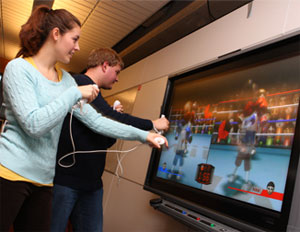 |
| Nicole Nixon and Justin White spar in the Edge Lab (Nick Pearce photo). |
It was the holiday shopping seasonâs biggest question: where can I find a Wii?
Not on store shelves. For the second holiday in a row Nintendoâs latest videogame console was the hot-ticket item that retailers just couldnât keep in stock. But you could find it in living rooms, dorm rooms, retirement homes and even fitness centres, where kids from eight to 88 have been swinging, punching and âwagglingâ to the beat of a more active gaming experience.
Nintendo has marketed the Wii as an engaging new way to get people off the couch and into the action. But does it actually have significant fitness value?
Thatâs what Justin White wanted to find out. âI was playing Wii boxing with a friend and noticed how exerting it was,â says the fourth-year kinesiology student, who saw an opportunity to combine his love of gaming with his studies. âI thought to myself, âIâm working up a sweat doing this Nintendo thing, I might run with that.â So I put together an outline and the class thought it would be a good project to take on.â
The class in question was Applications in Exercise Physiology, and its professor â Dr. Jo Welch â welcomed the unique experiment. âIâve always held that the âbest exerciseâ is exercise that a person will do,â she explains. âBecause different activities appeal to different people, the more options that are ready available, the more likely it is that exercise will occur.â
But videogames as exercise? Itâs not as crazy an idea as you might think. The secret to the Wiiâs runaway success is its motion-sensing controller, which contains built-in accelerometers that respond to the playerâs movements. The system also comes with Wii Sports, a five-games-in-one software package thatâs the perfect showcase for the technology. Swing the remote like a tennis racket, golf club or baseball bat and your âMiiâ on the screen does the same. You can even add the Wiiâs ânunchukâ attachment for a two-fisted boxing match, the gameâs most intense workout.
It was the boxing game that Mr. White and 27 of his fellow classmates tested against more traditional forms of exercise: a walk in Point Pleasant Park and a boxercise video workout. Every student participated in each activity for 30 minutes as their classmates measured heart rates and levels of perceived exertion â how hard the participants thought they were working out.
The verdict? Each studentâs final report looked at the numbers a bit differently, but the consensus was that it really depends on what sort of physical activity youâre looking for. âWhat I noticed in my findings is that the Nintendo Wii, on average, would not provide a great enough stimulus to produce health benefits in the participants studied,â explains Nicole Nixon, one of the participating students. âBut when I compared potential health benefits for weight management and cardiorespiratory fitness, some of the participants would receive some weight management benefits.â
It seems that while the Wiiâs boxing game isnât intense enough to provide a comprehensive cardiovascular workout, it can play a role in maintaining or losing body weight, especially if someone is starting from a lower level of fitness. âIf theyâre looking for cardiovascular fitness, Iâd advise them to do something else because itâs really not intense enough,â says Mr. White. âBut if theyâre just looking to lose weight, itâs a good way to get started. It can also be a gateway to other things, and may get people interested in the actual sports themselves too.â
The most intense workout of the three trials was the boxercise video while walking, on average, provided less of a stimulus than the Wii. But Mr. Whiteâs report noted something interesting: study participants who were gamers to begin with had a lower level of perceived exertion playing Wii boxing. In other words, it felt less like exercise because they were enjoying it more.
Thatâs why he thinks that thereâs immense potential in the phenomenon that the Wii has started: interactive fitness that plays more like gaming than exercise. âJust look at some of the other things that have been happening over the past 10, 12 years with video games in learning for kids,â he elaborates. âThere are so many computer games for math, spelling, language skills â all of these things that used to be taught using books are now becoming interactive. The same thing could easily happen with exercise.â
That thesis may be put to the test later this year when Nintendo releases Wii Fit, an exercise game that comes with a weight-sensing balance board allowing players to perform yoga, push-ups and other exercises and track changes in their body-mass index. It has already sold over a million copies in Japan.
Disclaimer: the author is himself a proud Wii owner, though he admits that heâs lost significantly more hours than pounds to videogaming over the years.
